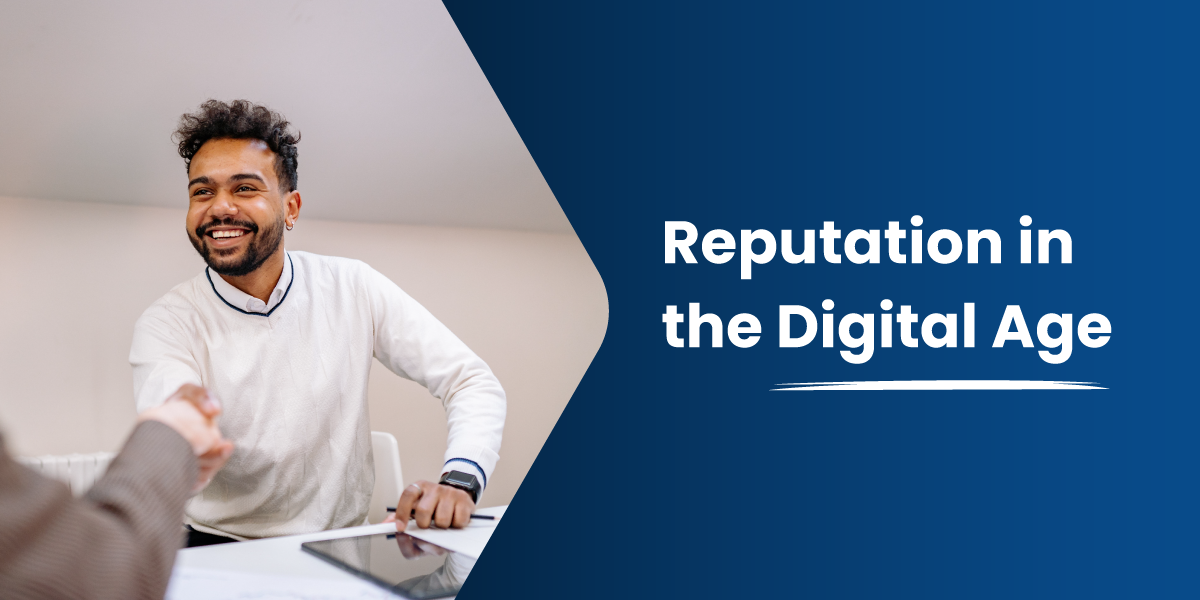How to Protect and Manage Your Reputation in the Digital Age
Your personal reputation extends beyond the physical world to the online sphere. Understanding how to effectively manage and protect this facet of your personal brand has become a vital skill. With the advent of social media, blogs, websites, and online forums, your personal reputation can be enhanced or damaged within moments.
Understanding the Importance of Personal Reputation in the Digital Age
Our personal reputation is our most valuable asset. It shapes how others perceive us, influencing our relationships, career opportunities, and even our sense of self-worth.
But what exactly is personal reputation? It is the collective impression that people have of us based on our actions, behaviors, and the way we present ourselves to the world; this concept has taken on a whole new dimension.
The Impact of Digital Footprint on Personal Reputation
The digital age has brought about the concept of a "digital footprint." This refers to the digital trail that we leave behind us as we interact online. Every social media post, blog comment, picture upload, and even browser search contributes to our digital footprint, leaving an indelible mark on our online reputation.
Think about it—every post, Facebook status update, or Instagram photo is a reflection of who we are and how we want to be perceived. Whether we realize it or not, our online presence is constantly being scrutinized by others, and this can have a significant impact on our personal reputation.
For example, a potential employer may search for our name on the internet before deciding to hire us. What they find can either reinforce a positive impression or raise red flags. Similarly, our personal relationships can be influenced by what others see online. A friend or romantic partner may form opinions about us based on our social media activity, which can either strengthen or weaken the bond we share.
The Role of Social Media in Shaping Personal Reputation
Social media platforms are a double-edged sword when it comes to personal reputation. On one hand, they provide an opportunity for us to share our thoughts, experiences, and achievements with a wide audience. We can connect with friends, family, and even strangers who share our interests and passions.
However, the very nature of social media also makes it easy for others to criticize, mock, or defame us. A single misinterpreted post or a thoughtless comment can go viral, causing potential damage to our reputation. The speed and reach of social media mean that one mistake can quickly overshadow all the positive aspects of our brand.
It is important, therefore, to be mindful of what we share online and how it may be perceived by others. We must consider the potential consequences of our digital actions and take steps to protect our reputation.
Building a positive personal reputation in the digital age requires a thoughtful and strategic approach. It involves curating our online presence, engaging in meaningful and respectful interactions, and being mindful of the impact our digital footprint can have on our overall reputation.
Ultimately, our personal reputation in the digital age is a delicate balance between self-expression and self-preservation. It is up to us to navigate this complex landscape and ensure that our online presence reflects the best version of ourselves.
Strategies to Protect Your Personal Reputation Online
Even though the potential risks of an unguarded online presence are high, several strategies can be employed to reduce these risks and protect your personal reputation online. In a time where information spreads like wildfire, it is crucial to be mindful of how you present yourself online. Your personal reputation can be easily tarnished by a single ill-advised post or negative comment. However, with the right strategies in place, you can safeguard your online presence and maintain a positive reputation.
Privacy Settings and Their Importance
The first line of defense in protecting your online presence is adjusting your privacy settings. By setting profiles to private, or limiting who can see your posts, you maintain control over what information is available to the public.
When it comes to social media platforms, such as Facebook or Instagram, it is essential to review and adjust your privacy settings regularly. Take the time to understand the different options available and choose the level of privacy that aligns with your comfort level. By doing so, you can ensure that only trusted individuals have access to your personal information and posts.
Furthermore, it is wise to be selective about accepting friend requests or connection invitations. Verify the authenticity of the person before granting them access to your online world. This simple precaution can help prevent potential harm to your personal reputation.
The Art of Positive Posting
One of the most effective strategies to enhance your online reputation is positive posting. This doesn't just mean sharing happy thoughts or achievements. It means maintaining a respectful, considerate tone, refraining from engaging in online arguments or sharing potentially divisive content.
When posting online, it is important to remember that your words and actions reflect who you are as an individual. Therefore, always think before you post. Consider the potential impact of your words on others and the image it portrays of you. By cultivating a positive online persona, you not only protect your personal reputation but also contribute to a more harmonious online community.
Additionally, showcasing your expertise and sharing valuable insights can help establish you as a reputable figure in your field. By consistently providing valuable content, you can build a positive online presence that others trust and respect.
Dealing with Negative Comments and Reviews
Despite taking every precaution, you may still find that you receive negative comments or reviews. How you react in these situations can have a huge impact on your online reputation.
When faced with negative feedback, it is essential to remain calm and composed. Responding with anger or defensiveness will only escalate the situation and potentially damage your reputation further. Instead, take a step back, evaluate the criticism objectively, and respond in a professional and empathetic manner.
Address the concerns raised in a constructive manner, acknowledging any valid points that have been made. By demonstrating your willingness to listen and make improvements, you can turn a negative situation into an opportunity to showcase your integrity and commitment to excellence.
It is also crucial to monitor your online presence regularly. By staying aware of what is being said about you or your brand, you can promptly address any negative comments or reviews. Engaging in open and transparent conversations with dissatisfied individuals can help mitigate the impact on your reputation and demonstrate your dedication to customer satisfaction.
Remember, protecting your reputation online is an ongoing process. It requires consistent effort and vigilance. By implementing these strategies and being mindful of your online actions, you can safeguard your reputation and ensure that your digital presence accurately reflects who you are as a brand.
Tools for Managing Your Online Reputation
With the abundance of information available on the internet, it's important to stay on top of what's being said about you or your brand. Fortunately, there are numerous tools available that can help you monitor and maintain a positive online presence.
One of the most popular tools for monitoring your online presence is Google Alerts. This free tool allows you to set up email notifications whenever your name or chosen keywords appear in new online content. By using Google Alerts, you can easily stay informed about any mentions of you or your brand, allowing you to address any potential issues or engage with positive feedback.
Google Alerts for Monitoring Your Online Presence
Google Alerts are a powerful tool that offer more than just monitoring your online presence. They can also be used to track industry trends, stay updated on competitors, and discover new opportunities. By leveraging the capabilities of Google Alerts, you can gain valuable insights and make informed decisions to enhance your online reputation.
In addition to monitoring tools like Google Alerts, social media management tools are also essential for managing your online reputation effectively. These tools allow you to manage multiple social media accounts from a single dashboard, saving you time and effort. With features like tracking mentions of your name or brand, scheduling posts, and analyzing engagement metrics, social media management tools provide a comprehensive solution for maintaining a positive online image.
Using Social Media Management Tools
Social media has become an integral part of our lives, both personally and professionally. Managing multiple social media accounts can be a daunting task, but with the right tools, it becomes much more manageable. Social media management tools offer a centralized platform to monitor and engage with your audience across various social media platforms.
These tools not only help you schedule and publish content, but they also provide valuable insights into your audience's behavior and preferences. By analyzing engagement metrics such as likes, shares, and comments, you can gauge the impact of your online presence and make data-driven decisions to improve your reputation.
The Role of Personal Websites and Blogs
While monitoring tools and social media management platforms are essential, creating a personal website or blog can further enhance your online reputation. A personal website or blog offers a unique platform to showcase your expertise, share your thoughts and experiences, and connect with your audience on a deeper level.
When it comes to building positive credibility, a professional-looking website or blog can be hugely beneficial. It allows you to present yourself in a positive light, highlight your achievements, and showcase your portfolio or work samples. By consistently creating valuable and engaging content, you can establish yourself as an authority in your field and build a strong online reputation.
Managing your online reputation requires a combination of monitoring tools, social media management platforms, and personal websites or blogs. By utilizing these tools effectively, you can stay informed about what's being said about you or your brand, engage with your audience, and build a positive online image. Remember, your online reputation is a reflection of your personal or professional identity, so it's crucial to invest time and effort into managing it effectively.
How to Repair a Damaged Online Reputation
If your online reputation has already been damaged, don’t despair. There are several steps you can take to repair your online image.
Identifying and Addressing Negative Online Content
Firstly, you need to identify the sources of negative content. Once located, you could respectfully ask the source to remove the content. If this isn’t an option, you can work on creating positive content to push the negative content down in search engine results.
The Power of Apologies and Rectification
If you have caused offense or made a mistake, it’s essential to apologize sincerely and swiftly. Follow that up with rectifying any damage done, if possible. This can go a long way in mitigating the negative effect on your reputation.
Seeking Professional Help for Reputation Management
Sometimes, repairing a damaged online reputation can be complex and time-consuming. In such cases, seeking advice from professionals who specialize in online reputation management is recommended.
Conclusion
Protecting and managing your personal reputation is vital to maintaining healthy and successful brand visibility. It requires sustained effort, but by employing smart strategies and tools, it is certainly achievable.

 Drive More Visibility, Traffic, and Sales
Drive More Visibility, Traffic, and Sales
